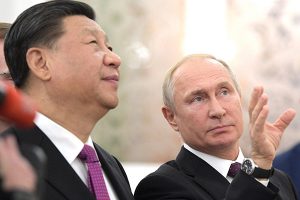Bloomberg
As China holds off in publicly criticizing Russian President Vladimir Putin’s invasion of Ukraine, a rare debate has emerged on Chinese social media over the military action by a close diplomatic partner.
Images of global anti-war protests — including in Russia— circulated on China’s Twitter-like Weibo over the weekend, as Putin’s forces shelled Ukrainian cities. Articles mocking Russia’s limited military gains were also shared, with some comparing Putin to a disgraced tai-chi master who was defeated in seconds by an amateur. Other users called for “defending common sense†by rejecting Russia’s perceived imperialist expansion, while state broadcaster CGTN aired appeals from Chinese students in Ukraine asking for peace.
Those criticisms were countered by a proliferation of pro-Russia voices, echoing Chinese Foreign Ministry claims last week that the US was the “culprit†of the conflict for “hyping†war and backing the expansion of the North Atlantic Treaty Organization. Communist Party mouthpiece People’s Daily and state-run CCTV both avoided the word “invasion†in favour of “Russia-Ukraine conflict.â€
Beijing is struggling to explain its support for Moscow as it defends Ukraine’s sovereignty. On the same day China abstained from a vote on a United Nations Security Council draft resolution that condemned the Ukraine invasion, Foreign Minister Wang Yi called for “ordinary people’s lives†to be safeguarded and reiterated Beijing’s support for Ukraine’s “territorial integrity.†Initial attempts to blame the US have been weakened by Washington’s decision to not send in troops and Putin’s civilian casualties. The Communist Party backed Global Times on Monday reported China’s position on the conflict “neutral.â€
“The Chinese government’s ambiguity in the official stance has given a small opening for alternative voices social media,†said Maria Repnikova, an assistant professor in global communication at Georgia State University. “The official media coverage on Ukraine has shifted in recent days to allow for more perspectives from Ukraine and immersive imagery of the conflict. This signals a widening space for social media discourse also.â€
Repnikova added that Chinese authorities have initially allowed some critical discussion of sensitive issues in the past, such as the outbreak of the coronavirus in Wuhan. “Leaving some space for critique facilitates venting but also public opinion observation for the Chinese government,†she said.
Already, limits are emerging. Posts questioning whether the Chinese Foreign Ministry blundered by dismissing intelligence of Russia’s invasion and not evacuating some 6,000 Chinese citizens before the attack were censored. A joint letter signed by five university professors denouncing the invasion was also wiped from Chinese social media. The state-backed Beijing News last week asked reporters to avoid criticizing Russia or carrying pro-Western voices, according to editorial guidance posted on its social media accounts that was later deleted.
 The Gulf Time Newspaper One of the finest business newspapers in the UAE brought to you by our professional writers and editors.
The Gulf Time Newspaper One of the finest business newspapers in the UAE brought to you by our professional writers and editors.
